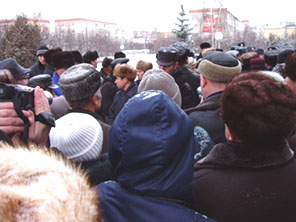Window on Eurasia: Blocking an "Orange Revolution" in the Middle Volga
20.01.05
 Mari-El's
president has employed highly coercive measures to stave off an "orange
revolution"-style challenge in that Middle Volga region - an indication
of the amount of public pressure for political change in at least one part
of Russia and a measure of the willingness of officials there to try to
do whatever it takes to block it. Mari-El's
president has employed highly coercive measures to stave off an "orange
revolution"-style challenge in that Middle Volga region - an indication
of the amount of public pressure for political change in at least one part
of Russia and a measure of the willingness of officials there to try to
do whatever it takes to block it.
During his earlier term, Mari-El President Leonid Markelov worked hard
to silence his opponents. During his watch, journalists were frequently
beaten by people who somehow were never caught by the authorities.
And the republic's independent newspapers could remain so only if they
were printed beyond Markelov's reach.
And in the course of the election campaign last fall, Markelov exploited
his incumbency to the hilt. He not only monopolized the electronic
media and published more campaign materials than the law allows, but his
officials blocked both his opponents from getting their campaign items
printed or from gaining access to most of the media.
Despite opposition complaints that Markelov's actions had made the election
into a farce and calls by some to boycott the vote, Markelov won
on December 19 with 57 percent of the vote, with his closest competitor
obtaining less than 20 percent. Signalling his pleasure with the
result, Russian President Putin on the very day of the vote gave Markelov
an award.
If Putin was paying attention to developments in this relatively small
Finno-Ugric republic - 760,000 people living on 23,300 square kilometers
- and drawing his own conclusions, few other outsiders have been. And at
that moment, Markelov almost certainly assumed that he had a more or less
cloudless future in the Mari-El capital of Ioshkar-Ola.
But three developments since then have attracted more attention to that
region and thereby changed the political equation there:
First, people likely connected to Markelov's regime succeeded in attacking
the wrong journalist. On January 7, three youths attacked Elena Rogacheva,
the Mari-El correspondent for Radio Free Europe/Radio Liberty who is also
the wife of a leading opposition journalist in what was almost certainly
an act of intimidation rather than a police crime.
No matter where they occur, attacks on journalists with outside connections
are almost certain to be covered by other journalists, both those in the
media itself and even more by those in media watchdog groups. That is precisely
what happened in this case..
Second, the opposition movement worked hard to adapt the tactics of
the Rose Revolution in Georgia and the Orange Revolution in Ukraine. Infuriated
both by Markelov's actions in the election and enraged by his suggestion
that it wasn't important for the republic to have an ethnic Mari as its
head - he is not - his opponents organized and went to court.
Markelov's subordinates were able to block the Mari-El opposition from
meeting as planned on December 23, although they were not able to prevent
the group from issuing appeals to President Vladimir Putin, Mari living
outside the republic, and other Finno-Ugric peoples around the world. (These
and other details can be found at http://www.mari.ee)
Nor could the authorities block the opposition's ability to appeal to
the courts, although not surprisingly, Markelov at least so far has been
able to block local courts from ruling against him. But the opposition
may be able to take the case further, attracting attention in places where
Margelov does not have full control.
And third, Markelov's response to this challenge at the time of his
inauguration on January 16 was so harsh that some outside media - including
news agencies like Regnum and newspapers like "Kommersant" - have begun
to shine the light of press coverage not only on the events of that day
but on some earlier developments in Mari-El as well.
On the day of the inauguration, some 300 of Markelov's opponents, including
both ethnic activists and pensioners angered by the Moscow's new benefits
plan, converged on Ioshkar-Ola's Lenin Square to protest. Completely
non-violent, they carried signs like "No to election falsifications" and
"We are not slaves."
What awaited them? An enormous number of heavily armed militia and OMON
officers spaced every meter or so across the square, apparently fortified
by other officers not in uniform. In the words of one participant,
it was like the October 1993 standoff in Moscow, leading him and others
to ask why weren't all these police at work fighting real crime.
However that might be, of course, the officers soon made short work
of the non-violent demonstrators, briefly detaining the participants until
the inaugural celebrations were over but threatening to bring charges against
the leaders of the opposition.
Such a show of force, of course, was clearly intended to intimidate
the opposition, but it may have had just the opposite effect. Not only
has the opposition pledged to continue the court-base challenges, but its
members may have gained an important ally: the kind of media attention
that could limit Markelov and empower them.
Paul Goble
|